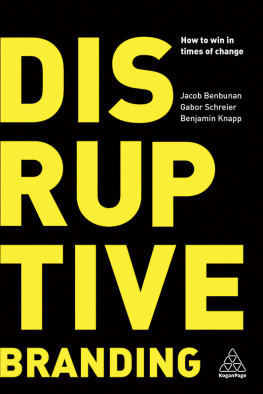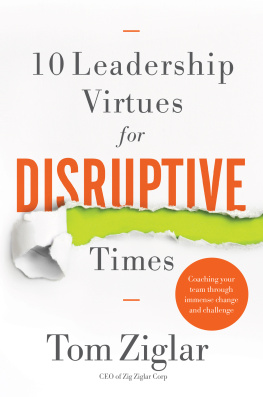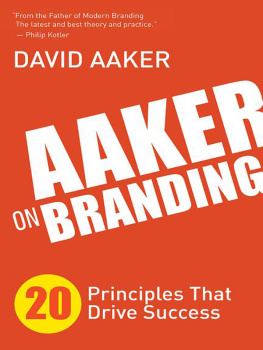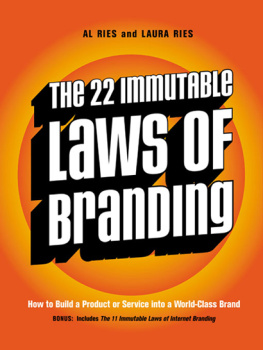Jacob Benbunan - Disruptive Branding: How to Win in Times of Change
Here you can read online Jacob Benbunan - Disruptive Branding: How to Win in Times of Change full text of the book (entire story) in english for free. Download pdf and epub, get meaning, cover and reviews about this ebook. year: 2019, publisher: Kogan Page, genre: Business. Description of the work, (preface) as well as reviews are available. Best literature library LitArk.com created for fans of good reading and offers a wide selection of genres:
Romance novel
Science fiction
Adventure
Detective
Science
History
Home and family
Prose
Art
Politics
Computer
Non-fiction
Religion
Business
Children
Humor
Choose a favorite category and find really read worthwhile books. Enjoy immersion in the world of imagination, feel the emotions of the characters or learn something new for yourself, make an fascinating discovery.
- Book:Disruptive Branding: How to Win in Times of Change
- Author:
- Publisher:Kogan Page
- Genre:
- Year:2019
- Rating:4 / 5
- Favourites:Add to favourites
- Your mark:
- 80
- 1
- 2
- 3
- 4
- 5
Disruptive Branding: How to Win in Times of Change: summary, description and annotation
We offer to read an annotation, description, summary or preface (depends on what the author of the book "Disruptive Branding: How to Win in Times of Change" wrote himself). If you haven't found the necessary information about the book — write in the comments, we will try to find it.
Disruptive Branding: How to Win in Times of Change — read online for free the complete book (whole text) full work
Below is the text of the book, divided by pages. System saving the place of the last page read, allows you to conveniently read the book "Disruptive Branding: How to Win in Times of Change" online for free, without having to search again every time where you left off. Put a bookmark, and you can go to the page where you finished reading at any time.
Font size:
Interval:
Bookmark:
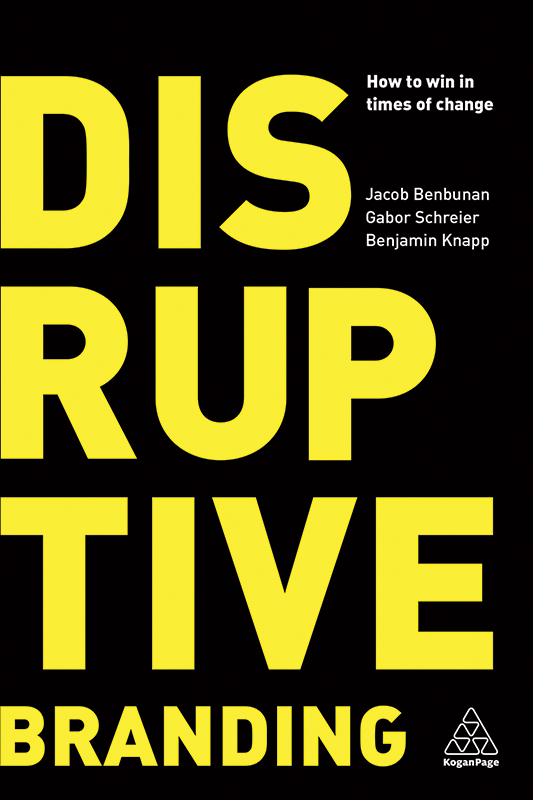
A treatise on branding in times of change that will guide marketers through their daily challenges.
Stefan Schindele, Brand Strategy, A1 Group
The authors prove that disruption is an attitude of creativity, agility and innovation that all brands should strive for. They provide a detailed and inspiring explanation of the process. A great book highly recommended!
Professor Robert Paulmann, Founder, CXI Conference
Jacob Benbunan and his team are the most disruptive people in the branding world, helping anybody in the start-up or corporate world who wants to rock the boat and do things very differently. This book is a must-read for anyone wanting to cause any abrupt or sudden change in new or legacy industries.
Carlos Muoz, Founder, Volotea and Vueling Airlines
A truly compelling read for those who believe that the best evidence of corporate authenticity is brand consistency.
Ana Busto, SVP, Brand and Communications, ENGIE
Jacob Benbunan founded Saffron Brand Consultants with the late Wally Olins and is its Chairman and CEO. His clients include Vueling Airlines, Akzo Nobel, A1 Telekom Austria, ENGIE, Sodexo and Siemens. Before Saffron he was a principal at Wolff Olins, where he worked with brands including Orange, Repsol and Acciona.
Gabor Schreier is Chief Creative Officer at Saffron, with responsibility for the creative teams across the businesss locations. He played a core part in consolidating Saffron into a leading international brand consultancy and has had an instrumental role in its work for A1 Telekom Austria, Gulf Air and YouTube. Previously he created identities for Daimler and Smart in Germany.
Benjamin Knapp is Saffrons Chief Growth Officer, driving corporate strategy and service development. His clients include Xing, the V&A, A1 Telekom Austria and Kyocera. Ben leads Saffrons place branding practice and has worked on branding for a number of cities and countries including London, Vienna, Poland and Trinidad and Tobago.
Saffron Brand Consultants is a global brand consultancy founded in 2001 by Jacob Benbunan and Wally Olins. We believe that brand is a means to an end and can harness the change companies face. With the global experience and stamina to guide clients through new and often disruptive realities, Saffrons team of strategists, designers and programme managers ensure brand delivers at every part of an organization. From brand idea to visual identity, from employer brand to experience design, Saffron makes brand work.
Writing this book has been a journey that has involved the efforts and dedication of many people.
We would like to thank all of our colleagues at Saffron, both past and present, for their help and dedication in shaping our ideas on the discipline. We would also like to thank the many clients we have worked with over the years without them there would be no brand book at all. Our special thanks go to the V&A, BQ, Vueling, Rostelecom, Voith and A1 for generously agreeing to appear in our case studies and for their contributions to the content.
In writing this book, we have benefited from the expertise and manpower of many colleagues. Our particular thanks go to Fernando Ortiz Ehmann, Charlotte Black, Adrian Pring, Silke Lampka, Amanda Calvo, Cristina Domecq, Isabel Rubio, Michle Richner, Rose Robertson, Jo Kassis, Miren Martnez, Matt Atchinson and Andrew Harb, who have all contributed their time and effort to making this book possible. Our thanks also go to Emma Daniels who stepped in at the final hour to help us make it over the finish line and to Tom Bourke and David Angulo for their work on designing the diagrams.
We would especially like to thank Carolina Aishemberg for her unwavering dedication in ensuring that the moving parts of writing and editing a book worked impeccably and for putting in the many hours required to ensure this book saw the light of day.
Most of all, we want to thank Claire Huxley. Without her tireless efforts it would have been simply impossible for you to be holding this book in your hands. Claire read, edited and reread our drafts and helped make the final version a smooth read. She made it possible for a Spaniard, a German and an Austrian to write a book together in three different cities and to sound as good as weve never done before.
Last but not least, we want to say thank you to our families for their support and understanding during the long hours we spent researching, writing and editing.
To our wives, Ana, Joanna and Susana
Why it is vital to explore disruptive branding
From London to Shanghai, Paris to So Paulo and Istanbul to Lagos, businesses and industries are experiencing seismic changes in the way they work. New challenger brands are appearing, apparently overnight, rewriting the rules of industry and reaping impressive market capitalizations. In their wake they leave disoriented boardrooms and executives not quite sure what happened, how they could have prepared and whether their company will survive in the new landscape. Whether transport, entertainment, hospitality, photography, energy or retail, it seems that no one is safe from the pull of disruption. Every brand now falls into one of two categories: the disruptors or the disrupted.
While disruption may only recently have reached the radar of the general public, the concept dates back a long way. As early as the 1950s Joseph Schumpeter spoke about the gale of creative destruction, a term that described the process of industrial mutation that incessantly revolutionizes the economic structure from within, incessantly destroying the old one, incessantly creating a new one.
Then in the 1990s Jean-Marie Dru, Chairman of advertising group TBWA, coined the French term stratgie de rupture to describe the innovative strategies he and his colleagues had to develop in response to clients that had brands in trouble. As Dru describes, the term tended to have negative connotations. It was employed to describe something that was problematic or even calamitous, like an earthquake or an epidemic (Dru, 2015).
In 1995, American academic and business consultant Clayton Christensen came up with a theory he called Disruptive Innovation, which strove to capture the relationship between new challenger start-ups and more established businesses. Christensen defined disruptive innovation as a process by which a product or service takes root initially in simple applications at the bottom of a market and then relentlessly moves up market, eventually displacing established competitors (Christensen, 1997). The idea gained traction in the business world, with its romantic framing of start-ups as a kind of David against the Goliath of established companies.
This tends to be the idea that journalists write about in headlines about every new start-up on the block. Therefore, this is also how most of us have come to view disruption. The story of disruption has become one of geeks working out of garages in Silicon Valley putting fear into the hearts of out-of-touch corporate fat cats. It is the domain of tech-savvy start-ups and the scourge of big business. It is something that small, daring companies do, and that all other businesses must try to either protect themselves from or simply avoid. Expensive advisors come up with strategies akin to building a castle with a deep moat; they speak of battening down the hatches and waiting out the storm.
Next pageFont size:
Interval:
Bookmark:
Similar books «Disruptive Branding: How to Win in Times of Change»
Look at similar books to Disruptive Branding: How to Win in Times of Change. We have selected literature similar in name and meaning in the hope of providing readers with more options to find new, interesting, not yet read works.
Discussion, reviews of the book Disruptive Branding: How to Win in Times of Change and just readers' own opinions. Leave your comments, write what you think about the work, its meaning or the main characters. Specify what exactly you liked and what you didn't like, and why you think so.

